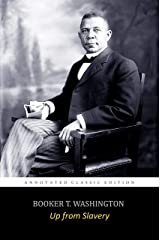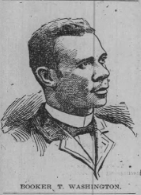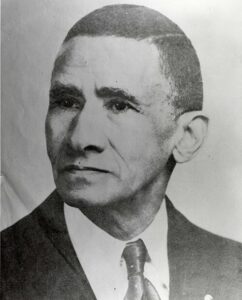Once upon a time in Black Entrepreneur History there was an African American man named Booker Taliaferro Washington who was born into the institution of slavery in Hales Ford, Virginia who went on to become the founder of the Tuskegee Institute in Tuskegee, Alabama and founder of the National Negro Business League while also being partly responsible for the mid-career success of the famous African American inventor, agriculturalist and entrepreneur George Washington Carver.
Starting with the beginning, his birth was on April 18, 1856. Booker T. Washington’s father is unknown, possibly a biracial or a white man, but his mother’s name was Jane, an enslaved African American woman on the Burroughs plantation in Virginia. He was nine years old when he and his entire family was freed due to the South losing the Civil War, leading to the freedom of thousands of enslaved.
The family fled Virginia to live in West Virginia. It was there she would be with her husband, the only father that Booker T. Washington knew and accepted as father. His name was Washington Ferguson.
Later in life, Booker T. Washington enrolled in Hampton Normal & Agriculture Institute which is now known as Hampton University and then ended up going to what is now known as Virginia Union University, previously known as Wayland Seminary.
He ended up working as a teacher back at Hampton, however, decided to take advantage of a great opportunity in Tuskegee, Alabama for a new African American school which was being built to equip students to become teachers. Washington would be the principal of the school and known as the school’s founder, opening the Tuskegee Institute on July 4, 1881.
It wasn’t soon after that Booker T. Washington led the school into a great expansion when he purchased more land and incorporated architecture and agriculture into the education of the students. By doing this, the students earned money and were taught not only education but the principles of living an independent, self sufficient life, knowing how to live off of the land, be both productive and intelligent while building their own homes and structures from the ground up.
It was this that Booker T. Washington didn’t want students to underestimate, the importance of knowing how to do the fundamentals, but not just knowing but making a living from it. Washington, through this type of teaching, gained much support from wealthy donors, and even talked George Washington Carver, who was a pioneer in agriculture, into teaching at Tuskegee.
This type of education would be part of the Atlanta Compromise, a speech that he gave the Cotton States International Exposition on September 18, 1895. It was an audience of white men, and Washington used the power of persuasion, the power of success and the power of black people to prove his argument for the African American.
Here is a portion of the speech below, followed by a partial recording and the speech in its entirety.
“Cast it down in agriculture, mechanics, in commerce, in domestic service, and in the professions. And in this connection it is well to bear in mind that whatever other sins the South may be called to bear, when it comes to business, pure and simple, it is in the South that the Negro is given a man’s chance in the commercial world, and in nothing is this Exposition more eloquent than in emphasizing this chance. Our greatest danger is that in the great leap from slavery to freedom we may overlook the fact that the masses of us are to live by the productions of our hands, and fail to keep in mind that we shall prosper in proportion as we learn to dignify and glorify common labour, and put brains and skill into the common occupations of life; shall prosper in proportion as we learn to draw the line between the superficial and the substantial, the ornamental gewgaws of life and the useful. No race can prosper till it learns that there is as much dignity in tilling a field as in writing a poem. It is at the bottom of life we must begin, and not at the top. Nor should we permit our grievances to overshadow our opportunities.”
This is a recording of a portion of Booker T. Washington’s Atlanta Compromise speech which he made before a mostly white audience, presenting the case that without African Americans there would never have been nor will ever be success at its highest level in America.One-third of the population of the South is of the Negro race. No enterprise seeking the material, civil, or moral welfare of this section can disregard this element of our population and reach the highest success. I but convey to you, Mr. President and Directors, the sentiment of the masses of my race when I say that in no way have the value and manhood of the American Negro been more fittingly and generously recognized than by the managers of this magnificent Exposition at every stage of its progress. It is a recognition that will do more to cement the friendship of the two races than any occurrence since the dawn of our freedom.
Not only this, but the opportunity here afforded will awaken among us a new era of industrial progress. Ignorant and inexperienced, it is not strange that in the first years of our new life we began at the top instead of at the bottom; that a seat in Congress or the state legislature was more sought than real estate or industrial skill; that the political convention or stump speaking had more attractions than starting a dairy farm or truck garden.
A ship lost at sea for many days suddenly sighted a friendly vessel. From the mast of the unfortunate vessel was seen a signal,“Water, water; we die of thirst!” The answer from the friendly vessel at once came back, “Cast down your bucket where you are.” A second time the signal, “Water, water; send us water!” ran up from the distressed vessel, and was answered, “Cast down your bucket where you are.” And a third and fourth signal for water was answered, “Cast down your bucket where you are.” The captain of the distressed vessel, at last heeding the injunction, cast down his bucket, and it came up full of fresh, sparkling water from the mouth of the Amazon River. To those of my race who depend on bettering their condition in a foreign land or who underestimate the importance of cultivating friendly relations with the Southern white man, who is their next-door neighbor, I would say: “Cast down your bucket where you are”— cast it down in making friends in every manly way of the people of all races by whom we are surrounded.
Cast it down in agriculture, mechanics, in commerce, in domestic service, and in the professions. And in this connection it is well to bear in mind that whatever other sins the South may be called to bear, when it comes to business, pure and simple, it is in the South that the Negro is given a man’s chance in the commercial world, and in nothing is this Exposition more eloquent than in emphasizing this chance. Our greatest danger is that in the great leap from slavery to freedom we may overlook the fact that the masses of us are to live by the productions of our hands, and fail to keep in mind that we shall prosper in proportion as we learn to dignify and glorify common labour, and put brains and skill into the common occupations of life; shall prosper in proportion as we learn to draw the line between the superficial and the substantial, the ornamental gewgaws of life and the useful. No race can prosper till it learns that there is as much dignity in tilling a field as in writing a poem. It is at the bottom of life we must begin, and not at the top. Nor should we permit our grievances to overshadow our opportunities.
To those of the white race who look to the incoming of those of foreign birth and strange tongue and habits for the prosperity of the South, were I permitted I would repeat what I say to my own race,“Cast down your bucket where you are.” Cast it down among the eight millions of Negroes whose habits you know, whose fidelity and love you have tested in days when to have proved treacherous meant the ruin of your firesides. Cast down your bucket among these people who have, without strikes and labour wars, tilled your fields, cleared your forests, builded your railroads and cities, and brought forth treasures from the bowels of the earth, and helped make possible this magnificent representation of the progress of the South. Casting down your bucket among my people, helping and encouraging them as you are doing on these grounds, and to education of head, hand, and heart, you will find that they will buy your surplus land, make blossom the waste places in your fields, and run your factories. While doing this, you can be sure in the future, as in the past, that you and your families will be surrounded by the most patient, faithful, law-abiding, and unresentful people that the world has seen. As we have proved our loyalty to you in the past, in nursing your children, watching by the sick-bed of your mothers and fathers, and often following them with tear-dimmed eyes to their graves, so in the future, in our humble way, we shall stand by you with a devotion that no foreigner can approach, ready to lay down our lives, if need be, in defense of yours, interlacing our industrial, commercial, civil, and religious life with yours in a way that shall make the interests of both races one. In all things that are purely social we can be as separate as the fingers, yet one as the hand in all things essential to mutual progress.
There is no defense or security for any of us except in the highest intelligence and development of all. If anywhere there are efforts tending to curtail the fullest growth of the Negro, let these efforts be turned into stimulating, encouraging, and making him the most useful and intelligent citizen. Effort or means so invested will pay a thousand per cent interest. These efforts will be twice blessed—blessing him that gives and him that takes. There is no escape through law of man or God from the inevitable:
The laws of changeless justice bind Oppressor with oppressed;
And close as sin and suffering joined We march to fate abreast…
Nearly sixteen millions of hands will aid you in pulling the load upward, or they will pull against you the load downward. We shall constitute one-third and more of the ignorance and crime of the South, or one-third [of] its intelligence and progress; we shall contribute one-third to the business and industrial prosperity of the South, or we shall prove a veritable body of death, stagnating, depressing, retarding every effort to advance the body politic.
Gentlemen of the Exposition, as we present to you our humble effort at an exhibition of our progress, you must not expect overmuch. Starting thirty years ago with ownership here and there in a few quilts and pumpkins and chickens (gathered from miscellaneous sources), remember the path that has led from these to the inventions and production of agricultural implements, buggies, steam-engines, newspapers, books, statuary, carving, paintings, the management of drug stores and banks, has not been trodden without contact with thorns and thistles. While we take pride in what we exhibit as a result of our independent efforts, we do not for a moment forget that our part in this exhibition would fall far short of your expectations but for the constant help that has come to our educational life, not only from the Southern states, but especially from Northern philanthropists, who have made their gifts a constant stream of blessing and encouragement.
The wisest among my race understand that the agitation of questions of social equality is the extremest folly, and that progress in the enjoyment of all the privileges that will come to us must be the result of severe and constant struggle rather than of artificial forcing. No race that has anything to contribute to the markets of the world is long in any degree ostracized. It is important and right that all privileges of the law be ours, but it is vastly more important that we be prepared for the exercise of these privileges. The opportunity to earn a dollar in a factory just now is worth infinitely more than the opportunity to spend a dollar in an opera-house.
In conclusion, may I repeat that nothing in thirty years has given us more hope and encouragement, and drawn us so near to you of the white race, as this opportunity offered by the Exposition; and here bending, as it were, over the altar that represents the results of the struggles of your race and mine, both starting practically empty-handed three decades ago, I pledge that in your effort to work out the great and intricate problem which God has laid at the doors of the South, you shall have at all times the patient, sympathetic help of my race; only let this be constantly in mind, that, while from representations in these buildings of the product of field, of forest, of mine, of factory, letters, and art, much good will come, yet far above and beyond material benefits will be that higher good, that, let us pray God, will come, in a blotting out of sectional differences and racial animosities and suspicions, in a determination to administer absolute justice, in a willing obedience among all classes to the mandates of law. This, coupled with our material prosperity, will bring into our beloved South a new heaven and a new earth.
Source: History Matters Original Source: Louis R. Harlan, ed., The Booker T. Washington Papers, Vol. 3, (Urbana: University of Illinois Press, 1974), 583–587.
Basically, Washington wanted African Americans to remain separate, but equal in every way to the opportunities white people had when it came to economics, education and the like. In that separation, he wanted black people to not just know how to work the field, but they would also own the field. It would be a form of entrepreneurship that was self reliant, even if the majority of them were not in high positions. They would still be owners and self sufficient.
This is where W. E. B. Du Bois, a famous northern born African American speaker and activist clashed with Booker T. Washington. W.E.B. Du Bois wanted black people to go beyond the fields and agriculture. There vastly different outlooks can be understood depending on which side of the border you stood, Du Bois in the North and Washington in the South.
The black people who lived in the North had different opportunities than those in the South because the laws were much more cruel to blacks in the South vs. the North. Therefore, there had to be different avenues for black people to achieve success at that time in history. Of course, today, things are much different and both viewpoints can be seen as ways of success in some ways – for the farmer and the financial analyst.
Even though he had the support of many, white and black, there were those didn’t care for him much at all, especially when he became the very first African American man invited to the White House by the president himself – Roosevelt – in 1901. Yes, the president was a fan.
Booker T. Washington was founder of the National Negro Business League which was founded in order to promote the development of African American entrepreneurs. He founded the NNBL in Boston, Massachusetts and grew to having chapters all across the USA, 320 in total. Although the league had a foundation in business, it also fought for civil rights.
Marriages
Booker T. had married three times. His first marriage to Virginian Fanny Smith Norton, and they had one daughter, Porshia Marshall. Booker Taliaferro Jr. and Ernest Davidson were sons from his second wife, Olivia America Washington. Margaret Murray was his third wife who was from Mississippi, and in the 1900s census, they had no children together but she was the stepmother. All his children lived with him due to his first two wives having passed away.
Books by Booker T. Washington
- Up From Slavery (1901)
- The Negro Problem
- Sowing & Reaping
- The Story of the Negro
Death
Booker T Washington passed away on November 14, 1915 at his home in Tuskegee, Macon, Alabama and buried in Tuskegee Institute, along with the rest of his family.
Little Known Facts About Booker T. Washington
- He was 5 feet 8 inches tall and his eyes were gray according to his 1910 passport which was issued August 9th.
- He was listed as a teacher on the 1880 census and single.
Sources
National Archives and Records Administration (NARA); Washington D.C.; Roll #: 119; Volume #: Roll 0119 – Certificates: 36171-37070, 28 Jul 1910-16 Aug 1910
Year: 1880; Census Place: Chesapeake, Elizabeth City, Virginia; Roll: 1363; Page: 21B; Enumeration District: 013 – Ancestry.com
Year: 1900; Census Place: Tuskegee, Macon, Alabama; Page: 1; Enumeration District: 0107; FHL microfilm: 1240027
Ancestry.com. Alabama, Deaths and Burials Index, 1881-1974 [database on-line]. Provo, UT, USA: Ancestry.com Operations, Inc., 2011.





More Related Stories
Isaac Scott Hathaway – Founder of Isaac Hathaway Art Company & Designer of First African American Coin
James Wormley – Founder of the Most Expensive Hotel in Washington D.C. in 1800s – the Wormley Hotel
William E. Matthews – Wealthy Financial Broker & Civil Rights Leader of 1800s